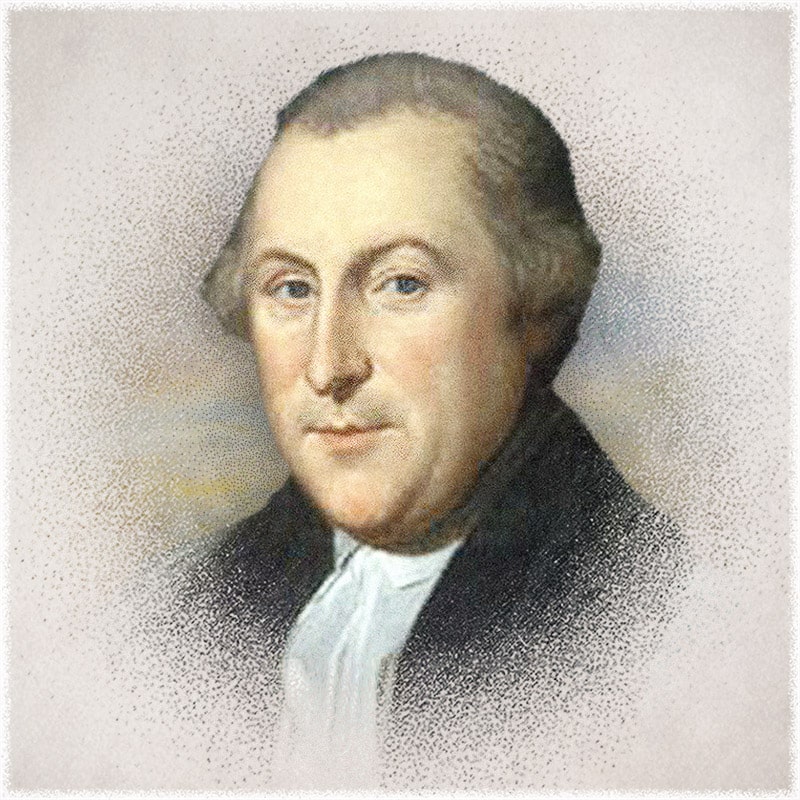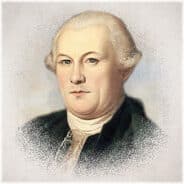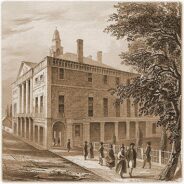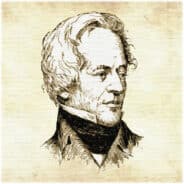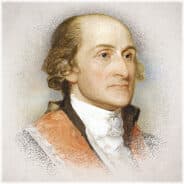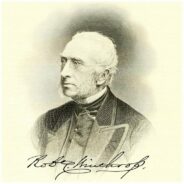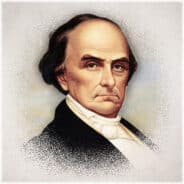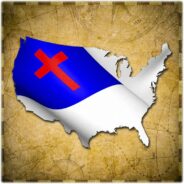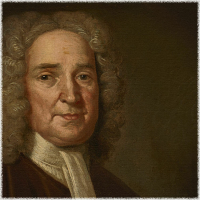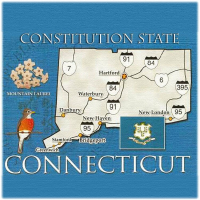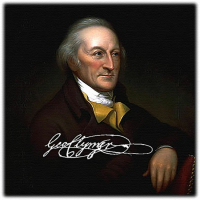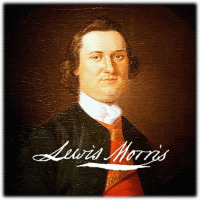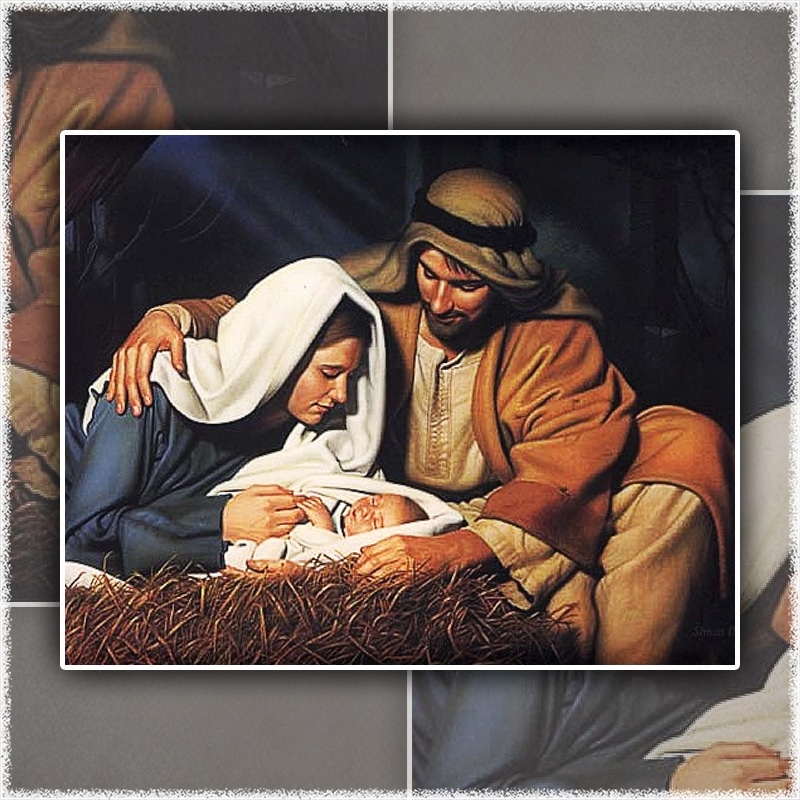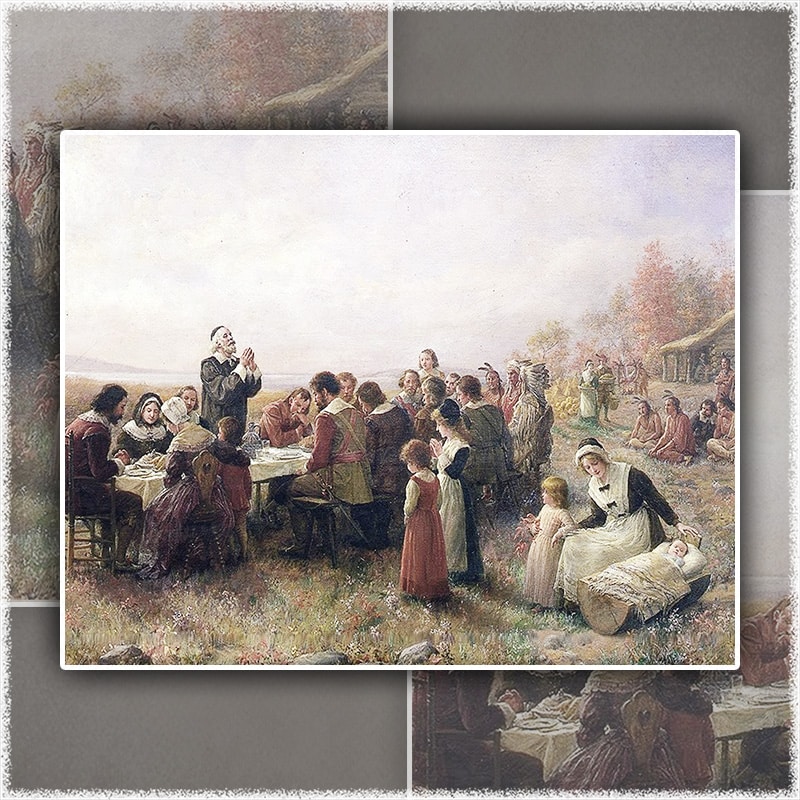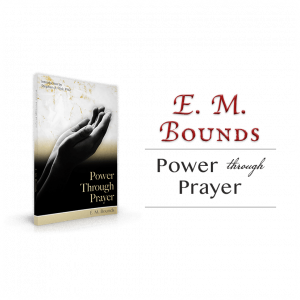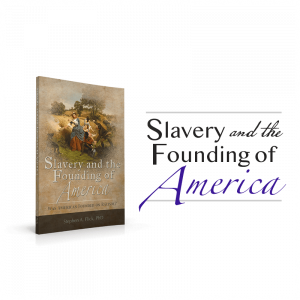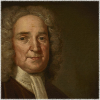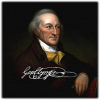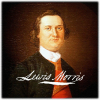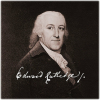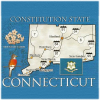Founding Fathers Begin Bible Societies
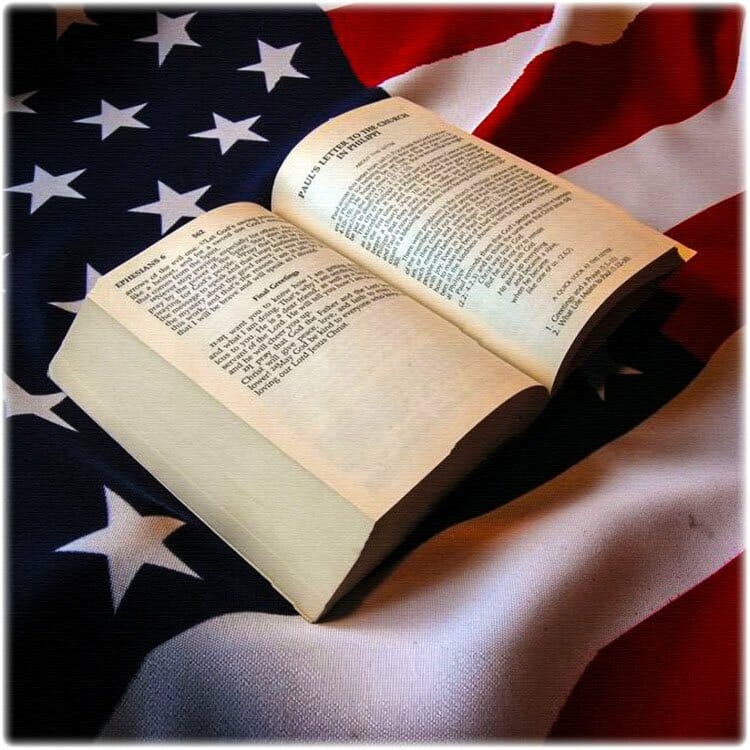
The week of Thanksgiving in America has been designated as National Bible Week. As is the case for nearly all national celebrations, the historical facts demonstrate that America's origin was not secular but sacred—and National Bible Week is no exception to this rule. Click to read the entire article…
Despite the fact that America was founded and maintained as a Christian nation from its inception until the middle of the twentieth century, the fallacy that America was founded as a secular nation persists and was widely advocated under the presidency of Barack Obama. For decades, the true Christian origin of America has been removed from school textbooks, state and national monuments, and other public-facing historical markers and records. The kidnapping of America's true Christian origin by secularists has been well documented; one of the most important books on the subject is Catherine Millard's, Rewriting of America's History.[1]
The week of Thanksgiving in America has been designated as National Bible Week. As is the case for nearly all national celebrations, the historical facts demonstrate that America's origin was not secular but sacred—and National Bible Week is no exception to this rule.
Settling America upon a firm governmental foundation was only a portion of the concern of America's Founding Fathers. The histories of the American colonies and the states to which they gave birth demonstrate that the principles and practices of Christianity were important components in the life of the nation from the very beginning. Far from believing that a nation could realize happiness and true prosperity without acknowledging God, Founding Fathers promoted days of fasting and thanksgiving, first from the individual colonial or state governments, then from the federal government. Often the legislative action to enact days of fasting and thanksgiving read like brief Christian theological treatises, providing the rationale behind the action.
Having settled many affairs of government at state and federal levels, Founding Fathers aggressively set out to ensure that succeeding generations of American's were equipped to perpetuate the Christian nation they had founded. The most prominent source quoted in the writings of the Founding Fathers was the Bible, and its pages were often quoted and consulted in the formation and deliberation of America's government. In fact, the Bible was quoted far more than any other single source.[2] Given this fact, it is no surprise that Founding Fathers eagerly sought to establish means by which knowledge of the Bible could be obtained by all Americans. The establishment of Sunday schools was one means of accomplishing this, and some of America's Founding Fathers labored earnestly to establish the American Sunday School Union. Another means of ensuring that Christian principles would continue to undergird the American Republic preceded this effort through the founding of Bible societies—hundreds of them.
Though by no means exhaustive, the few pages below begin to relate the importance of Bible distribution throughout the nation and the world as demonstrated by the example of America's Founding Fathers.
Article Contents
Bible Societies Begin in America
The modern Bible society movement began in 1804 with the founding of the British and Foreign Bible Society in London, but the effort soon leaped the Atlantic to quickly spread throughout America because America's Founding Fathers[3] believed the success of the American Republic depended upon the perpetuation of the Christian principles that birthed it. On November 10, 1808, Robert Ralston, a prominent merchant and philanthropist in Philadelphia wrote a letter to a friend in England, Josiah Roberts, expressing his desire to start a Bible Society in America. Mr. Ralston did not have long to wait. On December 12, 1808, the first formal meeting of the Bible Society of Philadelphia was convened, selecting Bishop William White—chaplain of Congress—as the first president and Dr. Benjamin Rush as the first vice president. In 1840, this first Bible society in America renamed itself to the Pennsylvania Bible Society.[4] By 1809, at least seven new Bible societies had been formed, including New York, Connecticut, Massachusetts, Maine and New Jersey, and by 1816, at least 130 Bible societies were organized in twenty-four states or territories—fifteen of which were "women's" societies.[5]
Bible Societies and the President of Congress
One of the leading voices in the Bible society movement was Elias Boudinot, American patriot of the American Revolution and President of the Continental Congress. Elias Boudinot was born in Philadelphia, Pennsylvania on May 2, 1740 to Elias Boudinot III, a merchant and silversmith, who was a neighbor and friend of Benjamin Franklin. His mother, Mary Catherine Williams, was born in the British West Indies of Welsh ancestry. Elias's paternal great-grandparents, Jean Boudinot and Marie Suire of Marans, Aunis, France, were Huguenots (French Calvinistic Protestants) who fled to New York about 1687 to avoid the persecution many Protestants experienced at the hands of King Louis XIV.[6]
The Boudinot family became firmly interwoven with other leading families of the American Revolution. Nine children were born to Elias's parents, Mary Catherine and Elias Boudinot Sr., but of these, only the younger Elias and his three siblings, Annis, Mary, and Elisha, survived to adulthood. Annis distinguished herself as one of the first published women poets in the Thirteen Colonies, while brother Elisha Boudinot became the Chief Justice of the Supreme Court of New Jersey. In addition to these distinctions, sister Annis married Richard Stockton, one of the fifty-six signers of the Declaration of Independence.
Into the War of Independence, Boudinot threw his life's energy. In 1775, he was elected to the New Jersey provincial assembly, and like all patriots, his thoughts were continually upon the support of the American cause. As the War of Independence was engaged, he loaned field commanders money to purchase desperately needed supplies for American forces and actively supported the efforts of American spies. His participation in the committee of correspondence no doubt was the natural bridge into American spying efforts.
On May 5, 1777, General George Washington asked Boudinot to accept the office of Commissary General for Prisoners, which managed enemy prisoners and supplied American prisoners held captive by the British. Congress concurred with his appointment, and Boudinot was granted a commission as colonel in the American Continental Army, giving him military authority to conduct his duties.
He held his office as Commissary General for only a relatively short period of time. In November 1777, the legislature of New Jersey appointed him as a state delegate to the Second Continental Congress, but his duties as Commissary prevented him from attending. In May 1778, he resigned his office as Commissary and by July 7, 1778, he was able to attend his first session of Congress, from which place he continued to seek the welfare of prisoners of war.
With his first term in Congress ending at the close of 1778, he did not return to Congress until 1781, at which time he served in this office until 1783 when the term expired. One of the great distinctions of his life was experienced in Congress when he served from 1782 to 1783 as President of Congress. But, additional distinction was received when, as President of Congress, he was called upon to sign the treaty of peace with England, known as the Paris Peace Treaty (in 1783).
With American independence won, Elias returned to his law practice, but, like George Washington, he was called once again to serve his country. Once the United States Constitution was ratified in 1789, he was elected from New Jersey to the United States House of Representatives to serve in the First, Second, and Third Congresses (from March 4, 1789 to March 3, 1795), but refused to be re-nominated for the Fourth Congress. The same year he stepped down from Congress, President Washington nominated him as the second Director of the Mint, in which capacity he served from 1795 to 1805.
One of Boudinot's legacies to America occurred during his first term in the House of Representatives under the Constitution. On Friday September 25, 1789, Mr. Boudinot made a motion on the floor of the House of Representatives that would eventually help establish America's annual Thanksgiving. The details of his motion relate the fact that the Founding Fathers, indeed, wove their Christian convictions into the life of American government—a fact clearly recorded in the minutes of Congress:
Mr. Boudinot said, he could not think of letting the session [of Congress] pass over without offering an opportunity to all the citizens of the United States of joining, with one voice, in returning to Almighty God their sincere thanks for the many blessings he had poured down upon them. With this view, therefore, he would move the following resolution:
Resolved, That a joint committee of both Houses be directed to wait upon the President of the United States, to request that he would recommend to the people of the United States a day of public thanksgiving and prayer, to be observed by acknowledging, with grateful hearts, the many signal favors of Almighty God, especially by affording them an opportunity peaceably to establish a Constitution of government for their safety and happiness.
Mr. Burke did not like this mimicking of European customs, where they made a mere mockery of thanksgivings. Two parties at war frequently sung Te Deum for the same event, though to one it was a victory, and to the other a defeat.
Mr. Boudinot was sorry to hear arguments drawn from the abuse of a good thing against the use of it. He hoped no gentleman would make a serious opposition to a measure both prudent and just.
Mr. Tucker thought the House had no business to interfere in a matter which did not concern them. Why should the President direct the people to do what, perhaps, they have no mind to do? They may not be inclined to return thanks for a Constitution until they have experienced that it promotes their safety and happiness. We do not yet know but they may have reason to be dissatisfied with the effects it has already produced; but whether this be so or not, it is a business with which Congress have nothing to do; it is a religious matter, and, as such, is proscribed to us. If a day of thanksgiving must take place, let it be done by the authority of the several States; they know best what reason their constituents have to be pleased with the establishment of this Constitution.
Mr. Sherman justified the practice of thanksgiving, on any signal event, not only as a laudable one in itself, but as warranted by a number of precedents in holy writ: for instance, the solemn thanksgivings and rejoicings which took place in the time of Solomon, after the building of the temple, was a case in point. This example, he thought, worthy of Christian imitation on the present occasion; and he would agree with the gentleman who moved the resolution.
Mr. Boudinot quoted further precedents from the practice of the late Congress [and how this had been done on four occasions] ; and hoped the motion would meet a ready acquiescence.
The question was now put on the resolution, and it was carried in the affirmative; and Messrs. Boudinot, Sherman, and Sylvester were appointed a committee on the part of the House [to take the request for a day of Thanksgiving to President Washington].[7]
At this very first session of Congress under the United States Constitution, Elias Boudinot helped to initiate the first Presidential Thanksgiving Proclamation. Given the fact that it had been a practice of the Continental Congress to issue both fast and thanksgiving day proclamations (as previously discussed), he would not have regarded the request to issue this proclamation as anything new. In fact, several years earlier, on Saturday, October 18, 1783, a congressional committee, composed of James Duane, Samuel Huntington, and Samuel Holten, submitted a draft of a thanksgiving day proclamation to fellow members of the Continental Congress which was approved and signed by its president, non-other than Elias Boudinot![8]
Just as Benjamin Franklin sought to refute the irreligion of Thomas Paine, so Boudinot reflected the general sentiment of other Founding Fathers when he also formally refuted Paine's secularism. In fact, the Continental Congress denounced secularism when in the fast day proclamation of Saturday, March 11, 1780 it announced that one of the purposes of the proclamation was
. . . to banish vice and irreligion from among us, and establish virtue and piety by his Divine grace . . .[9]
When have Americans ever been informed of the fact that one of the earliest intents of America's Congresses was "to banish vice and irreligion"? Whereas Paine's first significant political work, Common Sense,[10] employed arguments based upon the Bible, his subsequent works The Rights of Man and Age of Reason were decidedly secular and irreligious. Paine published his Age of Reason in three parts, the first two parts were published in 1794 and 1795 and the third part, he published in 1807. Founding Fathers who had welcomed and supported Paine when he immigrated to America from England soon turned against him for having attacked Christianity in the Age of Reason. In fact, after receiving a manuscript of Age of Reason from Paine before its publication, Benjamin Franklin pleaded with Paine not to publish it.[11] With other Founding Fathers, Boudinot was incensed by Paine's Age of Reason and openly challenged Paine by publishing his own response in 1801 titled, The Age of Revelation, or The Age Of Reason Shown to Be an Age of Infidelity. In his book, Boudinot not only demonstrated his contempt for Paine's irreligion but also disclosed the contempt that America's Founding Fathers had for secular infidelity and deism.[12]
The notable expression of Boudinot's Christian faith in his most mature years occurred in relation to the formation of the American Bible Society. In poor health, Elias Boudinot was burdened for a "general Bible society" that could distribute the Bible throughout America and around the world.
As previously observed, by 1816 many state and local Bible societies existed, but Boudinot's vision for a Bible society was broader and universal in scope. In a letter to William Jay, the son of John Jay, America's first Chief Justice of the Supreme Court, Boudinot helped to lay the plans for what was to become the American Bible Society. The true Christian spirit of Boudinot and most of the Founding Fathers was reflected in his motivation to organize the society:
I wish to promote a principle of perfect equality of right, universal Brotherly love, founded on Gospel purity, and where we cannot agree to unite, we may agree to differ in peace and good will. I consider the present call to enter into our Lord's vineyard, as laborers, tho' at the eleventh hour, to be one of the most encouraging opportunities and imperious calls that ever has been conferred on the Christian Professor to promote the glory of God and the best interest of his fellow men.[13]
More than a month after Boudinot composed this letter to William Jay, a meeting was convened in New York City to organize "a general Bible Society" in America, and on May 11, 1816, the newly formed American Bible Society elected Elias Boudinot as its first president. Boudinot served in this capacity until his death five years later.
Beginning with Elias Boudinot, some very distinguished Americans have occupied the presidency of the American Bible Society. From the beginning of the American Bible Society, the first Chief Justice of the Supreme Court, John Jay, was a member. At the beginning of the Society, Chief Justice Jay was elected vice-president, and at the death of Elias Boudinot in 1821, Jay was elected president. Other distinguished presidents include Frederick Theodore Frelinghuysen—distinguished lawyer, United States Senator, and Secretary of State, Daniel Coit Gilman—president of Johns Hopkins University, Edwin Francis Hyde, a former president of the Philharmonic Society of New York, and one of the most distinguished vice-presidents was Francis Scott Key—author of the United States' National Anthem.
Please click this box to read one of Elias Boudinot's letters to the American Bible Society.Distinguished Leader Continues Effort
One final example of the Christian sentiment of America's Founding Fathers is found in one of the speakers of the House of Representatives. Robert Charles Winthrop (May 12 1809 to November 16 1894) was an American lawyer, politician, and philanthropist who at one point in his political career rose to the office of Speaker of the United States House of Representatives. Like most who lived during the Founding Era of the United States, Winthrop was concerned about the moral character of America's development. Though not considered by most as a Founding Father, Winthrop does represent the influence and legacy that the Founding Fathers exercised upon succeeding generations. Following the example of many Founding Fathers, Winthrop involved himself in the advancement of Christianity in America—particularly through his political influence, oratory, literary endeavors, and the distribution of the Bible.
Born in Boston to Thomas Lindall Winthrop and his wife Elizabeth Bowdoin Temple, he attended the prestigious Latin School of Boston before studying at Harvard University, where he graduated in 1828. After graduating from Harvard, Winthrop studied law with the well-known American statesman, Daniel Webster. As a powerful orator, Daniel Webster left a lasting impression upon the speaking ability of Winthrop. Serving in national politics for forty years, Webster served in the House of Representatives for eight years, in the Senate for nineteen years, and finally as the United States Secretary of State under three presidents.[14] Upon completion of his study of law with Webster, Robert Winthrop was admitted to the bar in 1831 and subsequently established a practice in Boston.
On March 12, 1832, Robert married Elizabeth Cabot Blanchard. Together, Robert and Elizabeth Winthrop had three children. When Elizabeth died after ten years of marriage, Robert married Adele Granger Thayer.
Only a few years after he established his law practice, Winthrop entered into a political career. From 1834 to 1840, he was a member of the lower house of the Massachusetts' legislature, during which time he was chosen speaker in 1838, 1839, and 1840. In 1840, he was elected to the United States Congress, where he served ten years with distinction, earning himself a reputation as an able debater, orator, and parliamentarian. From 1847 to 1849, he held the office of Speaker of the House of Representatives, and in 1850, he was appointed by the governor of Massachusetts to fill Daniel Webster's seat in the senate when Mr. Webster was appointed Secretary of State. When defeated in his bid for election to the senate by a coalition of Democrats and Free-soilers, he turned his efforts to an unsuccessful election bid for the office of governor of Massachusetts. Disappointed in political life, he retired from politics to devote himself to literary, historical, and benevolent interests.[15] While still the Speaker of the House, Winthrop received the distinction of being chosen to deliver the dedicatory speech of the laying of the cornerstone of the Washington Monument on July 4, 1848.[16]
He served as the President of the Massachusetts' Bible Society for several years where he advocated his conviction that Christian morality—as derived from the Bible—was necessary to produce a free society.[17] This sentiment was summarized in his 1849 speech, "The Bible," in which he stated, "Men, in a word, must necessarily be controlled either by a power within them or by a power without them; either by the Word of God or by the strong arm of man; either by the Bible or by the bayonet."[18]
To read Robert Winthrop speech, "The Bible," please click this box.Since the life of Jesus Christ, many nations have claimed to be "Christian," but none have applied the principles of the Bible to its national life to the degree that they have been applied in the United States of America. It is not true that any athlete, individual, institution, nation, or any other entity can become great by following practices and principles that are great in themselves. French statesman Alexis de Tocqueville came to America at the beginning of the nineteenth century to discover why America's Revolution had been so successful and the Revolution of French secularists in his homeland had been such a dismal failure. After traveling throughout young America, he concluded that America was great because America was good, and what made America great was the place that the Bible and Christianity were accorded. But before the principles of Scripture will be welcomed in the public life of any nation, they must first of all be applied to the lives of individuals—as they were for the most distinguished of America's Founding Fathers!
America deserves to know its true heritage.
Please contribute today!
[1] Catherine Millard, The Rewriting of America's History (Camp Hill, PA: Horizon House Publishers, 1991).
[2] Donald S. Lutz, The Origin of American Constitutionalism (Baton Rouge: Louisiana State University Press, 1988), 140ff.
[3] Prior to this, the Society for the Propagation of Christian Knowledge (SPCK, founded in 1698) and the Society for the Propagation of the Gospel (SPG, founded in 1701) attempted to provide Bibles to English readers in Britain and her colonies. D . Ewert, "Bible Societies," Dictionary of Christianity in America. eds. Daniel Reid, et al. Downers Grove, IL: Intervarsity Press, 1990.
[4] "Timeline History of the Pennsylvania Bible Society," Pennsylvania Bible Society (http://pabible.org/timeline_history.html, November 23, 2015).
[5] Ewert, "Bible Societies."
[6] "Elias Boudinot," Wikipedia (https://en.wikipedia.org/wiki/Elias_Boudinot, October 12, 2015).
[7] The Debates and Proceedings in the Congress of the United States With an Appendix Containing Important State Papers and Public Documents and All the Laws of a Public Nature: With a Copious Index. Washington [D.C.] : 1:949-950.
[8] Journals of the Continental Congress, 25:699-701
[9] Journals of the Continental Congress, 16:253
[10] Common Sense was first published in January 1776.
[11] After reading Paine's manuscript of Age of Reason, Mr. Franklin responded, urging him not to publish it. Jared Sparks, The Works of Benjamin Franklin (Boston: Tappan, Whittemore, and Mason, 1840), 10:281-282; quoted in "Benjamin Franklin's letter to Thomas Paine," WallBuilders (http://www.wallbuilders.com/libissuesarticles.asp?id=58, April 15, 2015).
[12] In his introduction, Boudinot wrote:
When I first took up this treatise, I considered it as one of those vicious and absurd publications, filled with ignorant declamation and ridiculous representations of simple facts, the reading of which, with attention, would be an undue waste of time; but afterwards, finding it often the subject of conversation, in all ranks of society, and knowing the author to be generally plausible in his language, and very artful in turning the clearest truths into ridicule, I determined to read it, with an honest design of impartially examining into its real merits.
I confess, that I was much mortified to find, the whole force of this vain man's genius and art, pointed at the youth of America, and her unlearned citizens, (for I have no doubt, but that it was originally intended for them) in hopes of raising a skeptical temper and disposition in their minds, well knowing that this was the best inlet to infidelity, and the most effectual way of serving its cause, thereby sapping the foundation of our holy religion in their minds.
. . .
. . . be assured . . . [reader] that this author's whole work, is made up of old objections, [that have already been] answered, and that conclusively, [answered] a thousand times over, by the advocates for our holy religion. Some of them he has endeavored to clothe with new language, and put into a more ridiculous form; but many of them he has collected almost word for word, from the writings of the deists of the last and present century. Elias Boudinot, The Age of Revelation, or, the Age of Reason Shewn to be an Age of Infidelity (Philadelphia: Asbury Dickins, 1801), xii, xiv, xv.
[13] In a letter to William Jay dated April 4, 1816, Boudinot wrote:
My dear Sir:
By the blessing of Almighty God, after near Six Months close confinement, I am permitted to set up in my Bed, for 3 Hours in the Day. These precious moments, I have devoted to a full consideration of one of the greatest and most interesting subjects (a general Bible Society) that has ever honored the Children of Men. Weak and feeble, scarcely able to think or write, my Efforts promised but little in the great Cause, when your welcome and unexpected Letter of the 2nd Ultimo was brought in. My-drooping Spirits were raised–my Heart was indeed cheered and my mind greatly revived. I could not help giving glory to God for the great Encouragement afforded me to press on in this glorious Cause, when I thus beheld his special Mercy in raising up so powerful a support in this joyous work and Labor of Love. Tho' it is not more than 2 Hours since I received it, I am attempting to scribble a few lines of acknowledgment and gratitude for your excellent memoir. I fear you will not be able to read it, being among my first essays in letter writing and rather against medical advice. I have already sent for a Printer to engage him to publish the memoir without delay, but I wish to have your candid opinion on my Idea of changing a few sentences of the constitution. I have prepared a very rough draught of one which greatly coincides with yours in the leading points, …
…
I wish to promote a principle of perfect equality of right, universal Brotherly love, founded on Gospel purity, and where we cannot agree to unite, we may agree to differ in peace and good will. I consider the present call to enter into our Lord's vineyard, as laborers, tho' at the eleventh hour, to be one of the most encouraging opportunities and imperious calls that ever has been conferred on the Christian Professor to promote the glory of God and the best interest of his fellow men.
…
Pardon, dear Sir, the garrulity of an old man who even forgets his extreme weakness and the prohibitions of his physician. Forgive his blunders and incorrectness, for he is almost exhausted. I can Only again express my obligations to you and subscribe myself with great sincerity.
Yours most Affectionately,
Elias Boudinot
"Letter from Elias Boudinot to William Jay on the Founding of a General Bible Society, Dated April 4, 1816," American Bible History (http://www.americanbiblehistory.com/boudinot-jay-letter.html, October 16, 2015).
[14] "Daniel Webster," Wikipedia (https://en.wikipedia.org/wiki/Daniel_Webster, October 27, 2015).
[15] "John Winthrop," Appletons' Cyclopædia of American Biography (https://en.wikisource.org/wiki/Appletons'_Cyclop%C3%A6dia_of_American_Biography/Winthrop,_John, October 27, 2015).
[16] The title of his speech was "National Monument to Washington." Robert Winthrop, Addresses and Speeches on Various Occasions (Boston: Little, Brown, and Company, 1852), 70-89.. Also see, "John Winthrop," Appletons' Cyclopædia of American Biography (https://en.wikisource.org/wiki/Appletons'_Cyclop%C3%A6dia_of_American_Biography/Winthrop,_John, October 27, 2015).
[17] "Daniel Webster," Wikipedia (https://en.wikipedia.org/wiki/Daniel_Webster, October 27, 2015).
[18] It should be noted that this speech was delivered while Winthrop was still the Speaker of the House of Representatives. Robert Winthrop, Addresses and Speeches on Various Occasions (Boston: Little, Brown, and Company, 1852), 172.
Bibles Societies
Bibles Societies
Bibles Societies
Bibles Societies
Bibles Societies
Bibles Societies
Bibles Societies
Bibles Societies
Bibles Societies
Bibles Societies
Bibles Societies
Bibles Societies
Bibles Societies
Bibles Societies
Bibles Societies
Bibles Societies
Bibles Societies
Bibles Societies
Bibles Societies
Bibles Societies
Bibles Societies
Bibles Societies
Bibles Societies
Bibles Societies
Bibles Societies
Bibles Societies
Bibles Societies
Bibles Societies
Bibles Societies
Bibles Societies
Bibles Societies
Bibles Societies
Bibles Societies
Bibles Societies
Bibles Societies
Bibles Societies
Bibles Societies
Bibles Societies
Podcast: 'Founding Fathers Begin Bible Societies,' by Dr. Stephen Flick.

